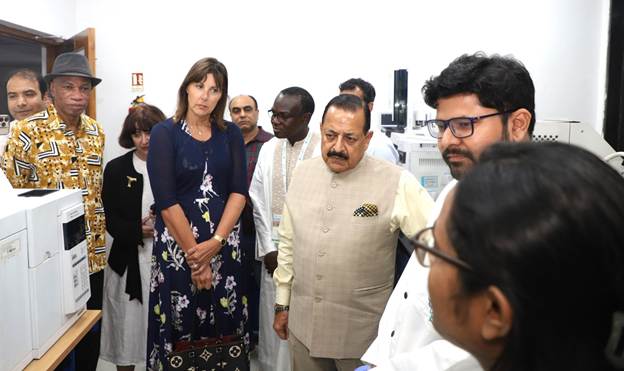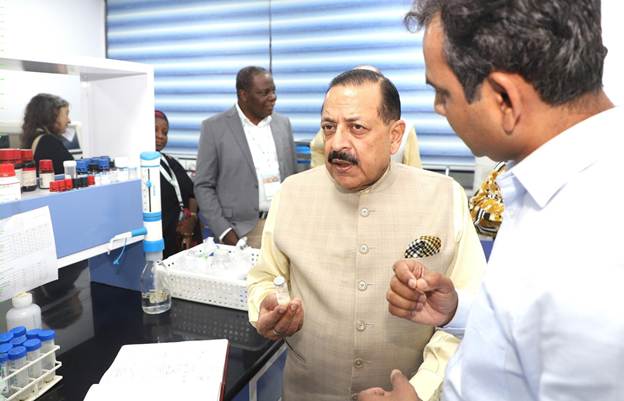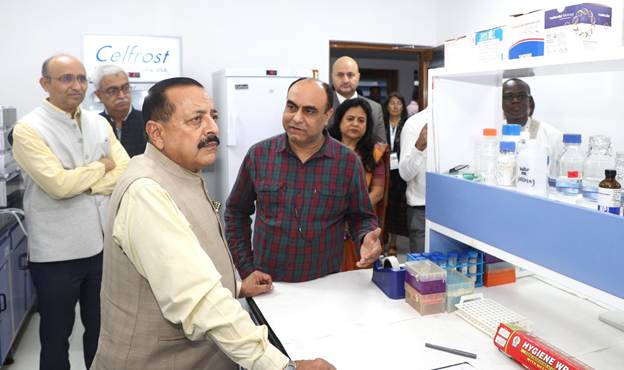Ministry of Science & Technology
India to Study Sustainability of Human Life in Space, as an important initiative under the BioE3 Biotechnology policy launched by PM Sh Narendra Modi, Announces Dr. Jitendra Singh
1st Experiment to Study Microgravity Impact on Edible Microalgae as Sustainable Space Nutrition Source: Dr. Singh
Second Experiment to Explore Spirulina as a “Superfood,” Compare Cyanobacteria Growth in Urea vs. Nitrate, and Advance Waste Recycling for Self-Sustaining Space Missions
Highlights India’s Vision for Global Biotech Leadership under Prime Minister Modi during Visit to 1st-of-its-Kind ICGEB Biofoundry
India to Conduct First-Ever Space Biology Experiments Aboard International Space Station (ISS) AXIOM-4 to Study Sustainability of Life with Indian astronaut Group Captain Shubhanshu Shukla as a crew member, announces Dr. Jitendra Singh
Posted On:
15 MAY 2025 6:53PM by PIB Delhi
In a historic announcementDr. Jitendra Singh, Union Minister of State (Independent Charge) for Science & Technology, Minister of State (Independent Charge) for Earth Sciences, MoS PMO, Department of Atomic Energy and Department of Space, MoS Personnel, Public Grievances and Pensions revealed that India is set to conduct its first-ever biological experiments aboard the International Space Station (ISS) to study the sustainability of Human life in Space, as an important initiative under the BioE3 Biotechnology policy launched by PM Sh Narendra Modi.

These unique experiments, spearheaded by the Indian Space Research Organisation (ISRO) in collaboration with the Department of Biotechnology (DBT), will be carried out as part of the upcoming International Space Station (ISS) mission AXIOM-4, with Indian astronaut Group Captain Shubhanshu Shukla as a crew member.
Dr. Jitendra Singh shared that the first experiment at the International Space Station will examine the impact of microgravity and space radiation on the growth of edible microalgae, a nutrient-rich potential food source for long-duration space missions. Rich in proteins, lipids, and bioactive compounds, microalgae are promising for safe and sustainable space-based nutrition.
This project is a joint initiative of ISRO, NASA, and DBT and aims to analyze key growth parameters and changes in transcriptomes, proteomes, and metabolomes of different algal species in space, as compared to Earth-based controls. The results will help identify the most suitable microalgal species for use in space environments, he added.
Microalgae offer several key advantages that make them ideal candidates for sustaining life in space. They have an extremely short life cycle, with some species growing in as little as 26 hours, allowing for rapid biomass production. Their high photosynthetic efficiency enables them to absorb carbon dioxide and produce oxygen effectively, contributing to air revitalization in closed environments like spacecraft. Additionally, microalgae can generate a higher biomass yield in photobioreactors compared to traditional plants, making them a more efficient and space-saving option for producing food and oxygen during long-duration space missions.
The second experiment at the International Space Station will study the growth and proteomic responses of cyanobacteria, such as Spirulina and Synechococcus, under microgravity conditions using urea- and nitrate-based media.

Dr. Jitendra Singh emphasized the need to recycle carbon and nitrogen from human waste during prolonged space travel to achieve self-sustainability in spacecraft and future extraterrestrial colonies. Cyanobacteria, due to their fast growth and efficient photosynthesis, are ideal agents for such recycling systems.
According to the Minister of State for Space, the experiment aims to explore Spirulina as a "superfood" due to its high protein and vitamin content, compare growth of cyanobacterial cells in urea versus nitrate environments, and study the effect of space conditions on their metabolic profiles.
The experiments have been developed in association with scientists from the International Centre for Genetic Engineering and Biotechnology (ICGEB), New Delhi, under the broader ISRO-DBT research collaboration.
The Minister shared these developments during his formal visit to the newly inaugurated DBT-ICGEB Biofoundry, a state-of-the-art facility funded by the Department of Biotechnology and hosted at ICGEB, New Delhi. The Biofoundry was virtually inaugurated by Dr. Singh during the 31st Meeting of the ICGEB Board of Governors.
The DBT-ICGEB Biofoundry will operate on the principle of the Design, Build, Test, and Learn (DBTL) cycle. The Design component of the Biofoundry includes the use of AI, big data, computational biology, and bioinformatics, as well as specific domain knowledge for DNA sequencing, pathway analysis, host selection, and experimental design. The Build component includes DNA assembly, combinatorial assembly, and organism transformation.
The Biofoundry supports microbial platforms such as bacteria and yeast and aims to develop biotech products for food, agriculture, chemicals, pharmaceuticals, and energy sectors. With an in-house production capacity of up to 20 liters, the facility is equipped to scale innovations to industrial levels and enable technology transfer to startups and manufacturers.
Dr. Jitendra Singh credited Prime Minister Narendra Modi for his visionary leadership and unwavering support in elevating India's biotechnology sector to a position of global leadership.

He also highlighted the significance of the BioE3 (Biotechnology for Economy, Environment & Employment) Policy, approved by the Union Cabinet in 2024, which aims to accelerate high-performance biomanufacturing. This national framework supports innovation and scale-up across six priority sectors, such as bio-based chemicals and enzymes, smart proteins and functional foods, precision therapeutics, climate-resilient agriculture, carbon capture and utilization, and marine and space research.
President ICGEB Board of Governors, Dr Jelena Begovic appreciated India’s efforts in ushering Space biotechnology.
Dr Rajesh Gokhale and Sr Adviser, DBT, Dr Alka Sharma; Dr Ramesh Sonti, Director, ICGEB New Delhi were also present during the visit and briefing.
******
NKR/ PSM
(Release ID: 2128904)
Visitor Counter : 2
Read this release in:
Urdu